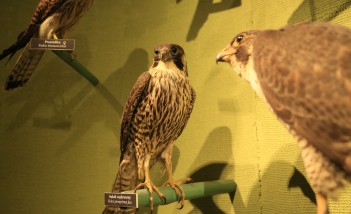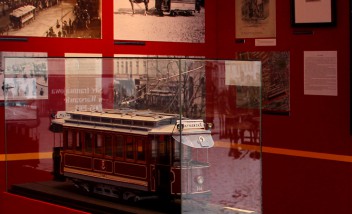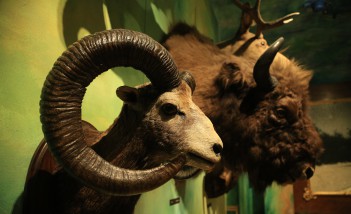
Discover the Museum of Hunting and Horsemanship

The Museum of Hunting and Horsemanship, which since 1 January 2018 has operated as a branch of the Royal Łazienki Museum in Warsaw, is located on the premises of the Royal Łazienki in the so-called Cantonists’ Barracks erected in the years 1826–1828 and in the Kubicki Stables dating to 1825–1826.
It strives to promote knowledge connected with the national tradition of hunting and horsemanship, breeding of horses on Polish lands as well as nature-related themes.
Here, visitors can enjoy permanent and temporary exhibitions. The permanent exhibitions, which are found in the Cantonists’ Barracks, feature: The Polish Hunting Room from the 19th and 20th century, forest animals, birds and exotic trophies. In the Kubicki Stables, renovated in 2019–2021, there are two permanent exhibitions: the Zbigniew Prus-Niewiadomski Coach House and the royal weaving factory.
The history of the Museum of Hunting and Horsemanship
The idea to create a hunting museum arose in the 1970s. Following negotiations with the Polish Hunting Association, the then director of the National Museum, professor Stanisław Lorentz, suggested that the new establishment should be located on the premises of the Royal Łazineki Museum, once called Hunting Grounds (Zwierzyniec). The Cantonists’ Barracks were chosen as the seat of the new museum. In the documents and publications devoted to the Royal Łazienki other names of that building appear as well: Invalids’ Barracks or the Gardener’s House. The two-storey building was erected on a rectangular plan in the years 1826-1828, in the southern part of the Łazienki manor. The architectural design was supposedly developed by Wilhelm Henryk Minter, the builder of the nearby barracks of the Hussars, Uhlans and Cuirassiers which have not survived to our times.
In 1982, two projects were combined: The creation of the Hunting Museum (a team working from 1977 under the direction of graphic artist Tomasz Konarski) and of the Horsemanship Museum (a team intending to create the Horse Museum). On 1 July 1983, one joint establishment was opened – The Museum of Hunting and Horsemanship.
The hippolocial exhibition was to be situated in the Kubicki Stables, also referred to as Horseshoe, of which a part (one wing) was devoted to the museum only in 1995. The Stables were constructed in the years 1825-1826, in place of the wooden ones, located on the premises of the manor. Jakub Kubicki designed the Stables on a plan of a horseshoe, with a more elevated two-storey middle section. It housed rooms for the service, while the wings on the ground floor and adjacent to the building body housed the stables; the side wings were used as couch houses.
The first permanent museum exhibition entitled "Spring, Summer, Autumn, Winter" was opened in 1985 in the Cantonists’ Barracks. The exposition showed the birds and mammals of the Polish forests and fields in an attractive form. In 1986, another exposition was opened to visitors – "Not Only About Hunting" (shown from 1992 in the rooms of the Officer Cadets School of the Royal Łazienki). The first room became the venue of artworks and collections of hunting arms and accessories; in the second room the main group of exhibits consisted of exotic trophies donated by Roman Hubert Hupałowski, and the third housed hippological collections. The Cantonists’ Barracks featured also the exhibition of the "Hunting Stories from Old Times to the Era of John III Sobieski".
Due to its subject matter – a combination of hunting- and horsemanship-related themes, which is historically justified – the Museum is a unique venue not only in Poland but also across Europe. It has over 10,000 exhibits, of which many have a considerable educative and material value.


